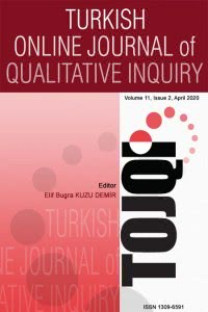The Effects of Study Abroad on Second Language Identities and Language Learning
Yurtdışı Eğitimin İkinci Dil Kimliği ve Dil Öğrenimi Üzerindeki Etkileri
___
- Benson, P., Barkhuzen, G., Bodycott, P., & Brown, J. (2012). Study abroad and the development of second language identities. Applied Linguistics Review, 3(1), 173193.
- Blackstone, B. (1997). Use of the CCAI (Cross-Cultural Adaptability Inventory) to assist students preparation in cross-cultural communication.The Review of Inquiry and Research, 65, 413425.
- Block, D. (2006). Multilingual identities in a global city : London Stories. London: Palgrave. Block, D. (2007). Second language identities. London: Continuum. Clandinin, D. J., & Connelly, F. M. (2000). Narrative inquiry. San Francisco: Jossey-Bass DuFon, M., & Churchill, E. (2006).Language learners in study abroad contexts. Clevedon, UK: Multilingual Matters. Elmuti, D., Tück, B., & Kemper, F. (2008). Analyzing cross-cultural adaptability among business students: An empirical investigation. International Journal of Management, 25, 551568.
- Erwin, T. D., & Coleman, P. K. (1998). The influence of intercultural experiences and second language proficiency on college students cross-cultural adaptability. International Education, 28, 525.
- Jackson, J. (2008). Language, identity, and study abroad: Sociocultural perspectives. London: Equinox. Kinginger, C. (2004). Alice doesnt live here anymore: Foreign language learning and identity construction. In A. Pavlenko & A. Blackledge (Eds.), Negotiation of identities in multilingual contexts (pp. 219242). Clevedon: Multilingual Matters. Kinginger, C. (2008). Language learning in study abroad: Case studies of Americans in France. Modern Language Journal, 92(s1). 1124.
- Kinginger, C. (2009). Language learning and study abroad. London: Palgrave Macmillan. Kitsantas, A., & Meyers, J. (2001). Studying abroad: Does it enhance college student cross-cultural awareness?Paper presented at the combined annual meeting of the San Diego State University and the U.S. Department of Education Centers for International Business Education Research (ERIC Document Reproduction Service No. ED 456648).
- Kurata, N. (2011).Foreign language learning and use: interaction in informal social networks. UK: Continuum Kanno, Y. (1996). Theres no place like home: Japanese returnees identities in transition. Doctoral dissertation, University of Toronto. Lyons, N., & LaBoskey, V. K. (2002). Why narrative inquiry or exemplars for scholarship of teaching? In N. Lyons & V. K. LaBoskey (Eds.), Narrative inquiry in practice: Advancing the knowledge of teaching (pp. 1130). New York: Teacher College Press. Magnan, S. S., & Back, M. (2007). Social interaction and linguistic gain during study abroad. Foreign Language Annals, 40(1), 4361.
- Miyahara, M. (2009). Researching identity and language learning: taking a narrative approach. Language Research Bulletin, 25, ICU. Morgan, B. (2007). Post structuralism and applied linguistics: Complementary approaches toidentity and culture. In J. Cummins & C. Davison (Eds.), International handbook of English language teaching (pp. 949968). New York: Springer Science + Business Media, LLC. Norton, B. (2000). Identity and language learning : Gender, ethnicity, and educational change. Harlow, England: Pearson Education Limited. Piller, I., & Takahashi, K. (2006). A passion for English: Desire and the language market. Retrieved March 8, 2013, from http://www.zfg.pwsz.krosno.pl/gfx/pwszkrosno/pl/defaultaktualnosci/675/5/1/s03_eb_piller2. pdf Polanyi, L. (1995). Language learning and living abroad: Stories from the field. In B. Freed (Ed.), Second language acquisition in a study abroad context(pp. 271291), Amsterdam: John Benjamins. Shaftel, J., Shaftel, T., & Ahluwalia, R. (2007).International educational experience and intercultural competence.International Journal of Business & Economics, 6, 2534.
- Siegal, M. (1996). The role of learner subjectivity in second language sociolinguistic competency: Western woman learning Japanese. Applied Linguistics, 17(3), 356382.
- Skarin, R. (2001). Gender, ethnicity, class and social identity: A case study of two Japanese women in US universities. In E. Churchill & J. McLaughlin (Eds.), Qualitative research in applied linguistics: Japanese learners and contexts (pp. 2655) Tokyo: Temple University. Twombly, S. (1995).Piropos and friendship: Gender and culture clash in study abroad. Frontiers: The Interdisciplinary Journal of Study Abroad, 1, 127. Webster, L., & Mertova, P. (2007). Using narrative inquiry as a research method: An introduction to using critical event analysis in research on learning and teaching. Oxford: Routledge. Wenger, E. (1998).Communities of practice: Learning, meaning, identity . Cambridge, UK: Cambridge University Press. Wolf, A. (2006). Subjectivity in a second language: Conveying the expression of self. Oxford: Peter Lang.
- ISSN: 1309-6591
- Yayın Aralığı: 4
- Başlangıç: 2010
- Yayıncı: Prof.Dr. Abdullah Kuzu
Mason'un Bilişim Etiği Boyutları Altında Vikipedi'nin İncelenmesi
Adile KURT AŞKIM, Şenay OZAN, Hatice ODABAŞI FERHAN
Mason'un Bilişim Etiği Boyutları Altında Vikipedi'nin İncelenmesi
ŞENAY OZAN LEYMUN, ADİLE AŞKIM KURT, HATİCE FERHAN ODABAŞI
The Effects of Study Abroad on Second Language Identities and Language Learning
Undergraduate Students' Experiences in Programming:Difficulties and Obstacles
Pre-Service Language Teachers' Reflections on the Implementation of a Blended-Learning Environment
Hatice Müge SATAR, SUMRU AKCAN
Undergraduate Students' Experiences in Programming: Difficulties and Obstacles
